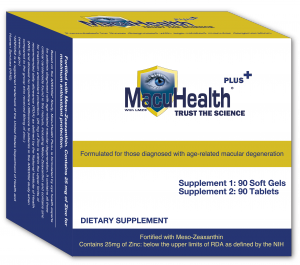2-Year Trial Demonstrates Improved Vision in Early AMD Patients
Research shows sustained vision improvement among people with most common cause of blindness who use dietary supplement
Participants in the study were all diagnosed with the early stages of age-related macular degeneration (AMD), a disease that results with central vision loss, typically in people over 55 years of age. There were 9.1 million cases of AMD in the U.S. in 2010 and this number is expected to increase to 17.8 million by the year 2050.
The research was conducted by a team from the Nutrition Research Centre Ireland (NRCI) at Waterford Institute of Technology (WIT). Those living with AMD would usually have been expected to experience a continued deterioration in their vision over the two years of the clinical trial. Instead, those receiving carotenoids showed a significant improvement across 24 out of 32 measures of vision.
During the trial, the volunteers taking part received supplementary meso-zeaxanthin, zeaxanthin and lutein (the three carotenoids that make up macular pigment) plus co-antioxidants (MacuHealthPLUS+) or supplementary zeaxanthin and lutein (only two of the three carotenoids that make up macular pigment) plus co-antioxidants (AREDS2).
Improvements in vision were particularly marked among those receiving all three carotenoids compared to those receiving only zeaxanthin and lutein. Of note, 34.8 % of trial participants on the MacuHealthPLUS+ formulation had what is deemed to be a clinically meaningful improvement in their vision after 24 months compared to 19.6% of patients on the AREDS2-like formulation. This result demonstrates the superiority of the formulation containing the central carotenoid meso-zeaxanthin. It is consistent with previous works highlighting the importance of meso-zeaxanthin to rebuild central dips in macular pigment in patients at risk of AMD and to improve visual performance.
Results from the study – the first of its kind in the world – are published in Investigative Ophthalmology & Visual Science (IOVS), one of the most respected, peer-reviewed journals in eye science.
The trial – called CREST (Central Retinal Enrichment Supplementation Trial) AMD – was conducted by Kwadwo Owusu Akuffo; Stephen Beatty; Jim Stack; David Kelly; Laura Corcoran and John Nolan from NRCI along with Tunde Peto, Queen’s University Belfast; Jim Stringham, Duke University, USA and Irene Leung, University College London Institute of Ophthalmology.
Prof John Nolan who co-founded the NRCI and the original Macular Pigment Research Group in Waterford, said: “These are hugely exciting findings and build on previous work that has been done at our Centre and elsewhere. AMD and the impaired vision that comes with it are a huge burden for patients and their families. The disease also brings a considerable economic burden, especially in its later stages. So, there’s a huge prize in finding an early intervention that can avert the need for expensive therapies and support systems.”
“These findings are the culmination of a tremendous body of work by a diverse group of committed people going back over several years. We also owe a huge debt of gratitude to the volunteers who participated in the trials without any guarantee of a favorable outcome. It’s been both humbling and rewarding to work with these people and to see the difference in their quality-of-life as the decline in their vision is arrested and they begin to notice a distinct improvement. The discovery from this work demonstrates the importance of meso-zeaxanthin for people with AMD. It is remarkable that we live in a time where we have identified a nutrient that has such a positive impact on vision and on a disease that otherwise causes blindness. Meso-zeaxanthin is a special nutrient and the CREST trial clearly confirms this.”
“The team involved also appreciate the support we have consistently received from Waterford Institute of Technology and a range of funding agencies including the European Research Council (ERC) who first funded our work in 2011.”
• Learn more about Nutrition Research Centre Ireland at www.nrci.ie or visit https://www.ncbi.nlm.nih.gov/pubmed/29053808 to read Investigative Ophthalmology & Visual Science.
Media contact: David Israel, (858) 381-4950
David Israel
MacuHealth
8583814950
email us here
Legal Disclaimer:
EIN Presswire provides this news content "as is" without warranty of any kind. We do not accept any responsibility or liability for the accuracy, content, images, videos, licenses, completeness, legality, or reliability of the information contained in this article. If you have any complaints or copyright issues related to this article, kindly contact the author above.

